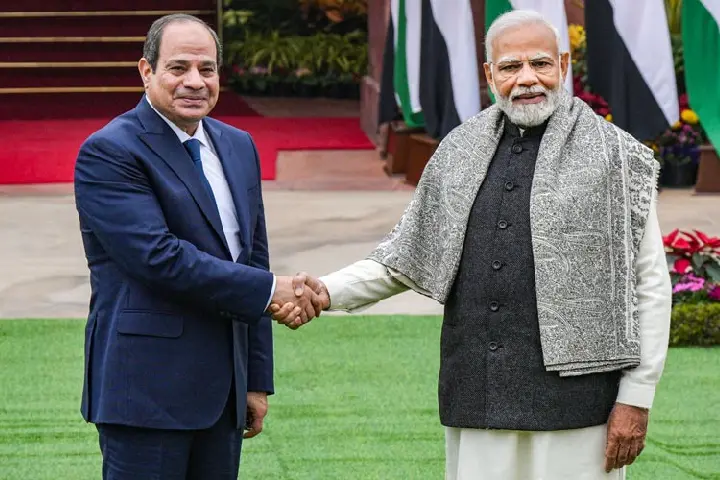Away from the media glitz, Egypt is set to be India’s key focus to increase its footprint in the Middle East and North Africa (MENA) region.
To consolidate partnership with Cairo, India batted for Egypt’s inclusion in BRICS, and now, it is also a key component of the African Union which has been included as a permanent member of G20 in recently concluded summit in New Delhi.
India’s ambassador to Egypt, Ajit Gupte, told the Egypt Daily News that India’s invitation to Egypt as special guest at G20 seeks to depoliticise the global supply of food, fertilisers, and medical products to prevent geopolitical tensions from leading to humanitarian crises and in this endeavour African nations such as Egypt have a special role to play.
Gupte suggested that India and Egypt could cooperate in various fields such as IT, digital economy, agriculture, environment, and health in the future.
Egypt is India’s most vital trading partner in Africa, with India’s exports to Egypt in FY 2021/22 amounting to $3.74bn, showing an 86% increase over the previous year.
The primary Indian imports from Egypt include mineral oil/petroleum, fertilisers, inorganic chemicals, and cotton. In contrast, the primary items India exports to Egypt are buffalo meat, iron and steel, engineering products, light vehicles, and cotton yarn.
Given that Egypt imports 90 per cent of its food requirements from Russia and Ukraine combinedly, the ongoing conflict there compels it to search for different suppliers. India, in that context, is a feasible option.
When asked why Egypt is crucial for India, Professor Manjari Singh of Amity University said: “While the answer lies in the history itself, changing global geopolitical and geoeconomic dynamics and Egypt’s current diplomatic and economic posturing as a facilitator and connector to the African, West Asian, and European markets, make it a viable, lucrative, and unavoidable strategic partner. India’s multi-level, multi-pronged and multi-faceted engagement with the wider Middle East and to an extent with the Western Indo-Pacific region has come in handy to further its relations with the West Asian and African nations.”
Egypt’s President Abdel Fattah Al-Sisi Arrives In Delhi For The #G20India2023 pic.twitter.com/8KzEouaKgH
— Narendra Modi fan (@narendramodi177) September 8, 2023
Singh, who foresaw the establishment of India-Middle East-Europe economic corridor, said that emerging non-conventional global crises have inadvertently equipped New Delhi to play a crucial role in the global economic, food and energy supply chains. “In that context, Egyptian centrality in the India-Middle East-Europe Freight-Food-Energy corridor is paramount,” she said.
At G20, Manjari feels the centrality of Suez Canal was not discussed much as for opening trade and supply routes and revival of the historical Red Sea is concerned.
“Egyptian control of the Suez Canal, its proximity to the Red Sea which enables it to link it with the Eastern Mediterranean, ascertains the Arab country’s capability as a nodal link by providing a different connectivity route to Europe via Red Sea-Mediterranean Sea route akin to Chabahar and International North-South Transport Corridor which connects India to Europe and Central Asian markets via Afghanistan, Iran, and Russia. Removal of trade barriers for smooth transportation exchange of resources is vital aspect in that regard, while New Delhi has already signed free trade agreement with Abu Dhabi and is likely to sign one with Tel Aviv; a similar agreement with Cairo becomes significant for it to penetrate in the African, West Asian and Mediterranean markets,” Singh said.
Singh’s assessment was shared by noted Delhi-based Scottish writer-historian William Dalrymple. Soon after the announcement of the India-Middle East-Europe corridor was announced, Dalrymple wrote on Twitter: “With the announcement today of the opening of an Indian-Middle Eastern Economic Corridor at G20, it looks the ancient trade routes up the Red Sea from India to Egypt that I am writing about in my new book, The Golden Road, and previewed here in @nybooks, will again become a global focus of economic and cultural exchange.”
With the announcement today of the opening of an Indian-Middle Eastern Economic Corridor at G20, it looks the ancient trade routes up the Red Sea from India to Egypt that I am writing about in my new book, The Golden Road, and previewed here in @nybooks, will again become a…
— William Dalrymple (@DalrympleWill) September 9, 2023




















